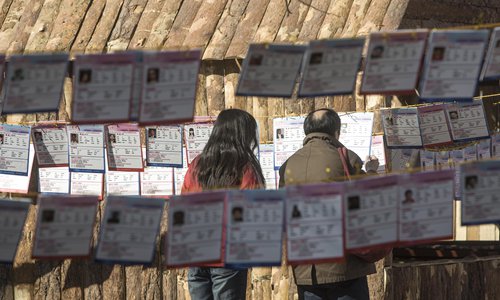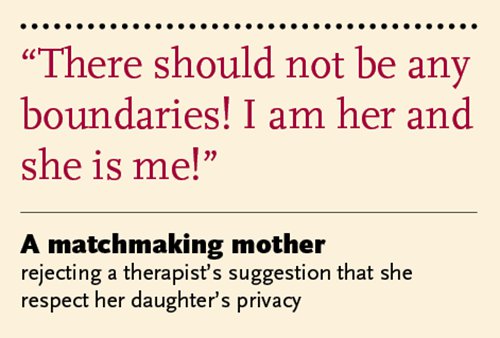

Matchmaking events are held in many cities, but many are only attended by parents looking for potential spouses for their children
Good looks, hukouhousehold registration, fertility are among the qualities most valued by parents
The ancient tradition of arranged marriages has continued until today as seen in matchmaking TV shows

People read about potential spouses at a matchmaking event in Shijingshan, Beijing. Photos: Li Hao/GT
Both holding placards highlighting their single daughters' most attractive qualities, one desperate mother said to another, "If I had known she would not find a boyfriend, I would've never encouraged her to study abroad."
This conversation took place in a corner of Zhongshan Park at the center of Beijing, next door to the Forbidden City. Every day, groups of concerned parents with unmarried children gather in the park, using the public space to display their children's information, in hope of making a suitable match.
Walking around the park, one can see cards that read "stable job," "Beijing hukou(household registration)" or "no bad habits."
They also listed what attributes their children - or they - want in a spouse: kind, good-looking, can take care of a family. One card reads "Anyone born after 1986 is okay, but not the year 1988," because the mother was afraid of a zodiac clash between year 1988 and 1982, when her son was born.
Speed dating on TV
Parents choosing spouses for their children is an ancient phenomenon. In dynastic China, marriages were arranged by parents and professional matchmakers based on the two families' wealth and social status.
In fact, it has retained such popularity that it has even made it to national television.
In December, a dating show started to air on Shanghai-based Dragon TV. The show, named Chinese-style Dating, has the slogan "once you become married, you bring honor to your whole family."
The show invites five unmarried men and their families on stage on some episodes, and five women and their families on others.
In the first episode, the bachelors and their families sat in different rooms. Then each potential bride came on stage to be judged and questioned by the families, while the men could not see them. The women in turn asked their own questions about the men without seeing them.
The first man came on stage with his mother and aunt. During the introductions, his aunt said that a gift for domestic work is the best quality of a wife. Another 23-year-old man came with his mother, who is a nutritionist. She explained she wants a daughter-in-law whose hands are warm, because "women with cold hands might have problematic wombs, leading to problematic children."
Then the show had the female guests come on stage one by one. Out of them was a beautiful woman who owns a soup restaurant and knows how to cook. After hearing about her culinary skills, all the men grew excited. But after she revealed she's divorced, 40 years old and a mother, they all fell silent.
The nutritionist mother immediately rejected the woman, saying, "My daughter-in-law should give the family two to three children." Her 23-year-old son insisted on picking the woman, and the mother then said to the woman, "You are 40 … 40-year-old men are very popular. How can you guarantee that you will still have control over my son's heart in 10 years?"
Ironically, the show was hosted by Jin Xing, China's first transgender talk show host. She recently spoke at the Davosforum in January about her experience of transitioning.
But some argue her views concerning women have always been quite outdated.
Yansubagua, a WeChat public account that publishes daily news and discussions of celebrity events with a feminist slant, once wrote an article saying Jin's views are gender discrimination disguised as sharp-tongued comments. Jin described Wendy Deng's divorce as "being kicked out of her family." In past interviews, Jin has told media she's quite traditional and said women should follow the old ways and obey their men.

Two parents swap their children's information in Zhongshan Park in central Beijing. Photo: Li Hao/GT
Borderless relationship
It's not a coincidence that the show went viral. After all, it already has a ready-made audience of matchmaking parents. The show merely presents the reality of marriage in China, some argue.
But on the other hand, some young people say this representation of reality is a stark reminder of how much Chinese parents meddle in their children's personal affairs. Immediately after air, the show came under heavy criticism from netizens.
Among them was Shen Bing, a 28-year-old translator working in Hangzhou, East China's Zhejiang Province.
Every time Shen goes home for the holidays, her parents force her to go on blind dates with the candidates they have already picked out. Unfortunately, they aren't always to Shen's taste.
"Once, my mother and I went on a date with a policeman and his mother. He had yellow teeth and bad breath. I added him on WeChat and his photos are all of him drinking with his friends while topless," Shen said.
She tried talking to the man, but quickly found they had nothing in common. The man only talked about gaming, while his mother bragged about his good qualities.
Peng Xiaohui, a sexology professor at Wuhan's Central China Normal University, said it's understandable that young people are not in favor of these arranged dates. The parents may see this style of dating as a tradition, but most children think it's outdated and overly controlling because values have changed over time.

Educating one's parents
After putting up with her mother for years, Sarah Li (pseudonym) started taking action to "transform" her.
Li's father passed away two years ago after battling with cancer. In that period, both of them forced her to go on blind dates, sometimes several in a week, so her father could live to see her walk down the aisle.
Ever since he died, she's been trying to fight these arrangements. Sometimes she cried and screamed, sometimes she broke things and slammed doors, but nothing worked.
Li eventually talked her mother into going to therapy. First it was therapy provided by her company and all the attendees were her colleagues. Her mother complained about her "terrible dating record" in front of all her colleagues while she wept.
The second time she took her mother to an outside clinic, where the therapist told Li's mother that she should give her daughter some space, some boundaries. But her mother lost it and started yelling at the therapist hysterically.
"There should not be any boundaries! I am her and she is me!" she screamed.
Li sensed that her mother, like many parents of her generation, might need help to learn how to handle their relationship with their children and how to respect their privacy.
She started reading psychology books and forwarding her mother articles about family relationships once in a while, in hopes of changing her attitude. She opened up, telling her mother about her own feelings.
"So far I haven't succeeded entirely, but I'm trying," she said.
Her mother still nags her about the details of her life, sometimes asking her four times a day to contact a man after she has specifically and repeatedly refused. But she's seeing some minor signs that her mother is changing for the better, and she hopes for greater mutual understanding in their relationship.
But at least in the coming years, Chinese-style dating parks are here to stay. Their children's marriage still remains top priority for many parents, judging from concerned faces at the Zhongshan park.
Asked whether her son is okay with her showing his information to hundreds of strangers, a woman in the park hesitated and said, "I know he wants to find a girlfriend."
As the Global Times reporter walked around in the park gawking at placards, she was finally stopped by some people, asking if she had personally come to the park looking for a date. But after the reporter said "I have no Beijing hukou," they all left her alone.
 Fire brigade in Shanghai holds group wedding
Fire brigade in Shanghai holds group wedding Tourists enjoy ice sculptures in Datan Town, north China
Tourists enjoy ice sculptures in Datan Town, north China Sunset scenery of Dayan Pagoda in Xi'an
Sunset scenery of Dayan Pagoda in Xi'an Tourists have fun at scenic spot in Nanlong Town, NW China
Tourists have fun at scenic spot in Nanlong Town, NW China Harbin attracts tourists by making best use of ice in winter
Harbin attracts tourists by making best use of ice in winter In pics: FIS Alpine Ski Women's World Cup Slalom
In pics: FIS Alpine Ski Women's World Cup Slalom Black-necked cranes rest at reservoir in Lhunzhub County, Lhasa
Black-necked cranes rest at reservoir in Lhunzhub County, Lhasa China's FAST telescope will be available to foreign scientists in April
China's FAST telescope will be available to foreign scientists in April "She power" plays indispensable role in poverty alleviation
"She power" plays indispensable role in poverty alleviation Top 10 world news events of People's Daily in 2020
Top 10 world news events of People's Daily in 2020 Top 10 China news events of People's Daily in 2020
Top 10 China news events of People's Daily in 2020 Top 10 media buzzwords of 2020
Top 10 media buzzwords of 2020 Year-ender:10 major tourism stories of 2020
Year-ender:10 major tourism stories of 2020 No interference in Venezuelan issues
No interference in Venezuelan issues
 Biz prepares for trade spat
Biz prepares for trade spat
 Broadcasting Continent
Broadcasting Continent Australia wins Chinese CEOs as US loses
Australia wins Chinese CEOs as US loses